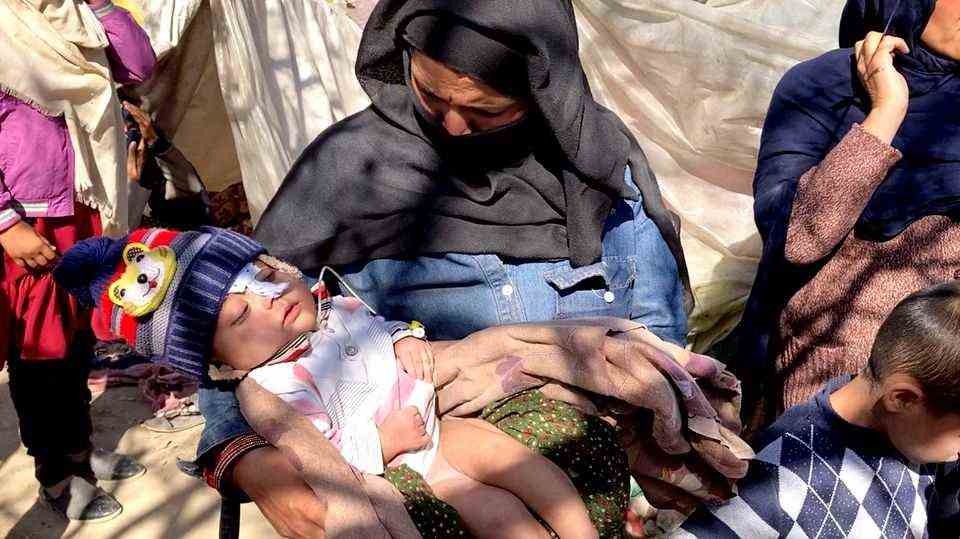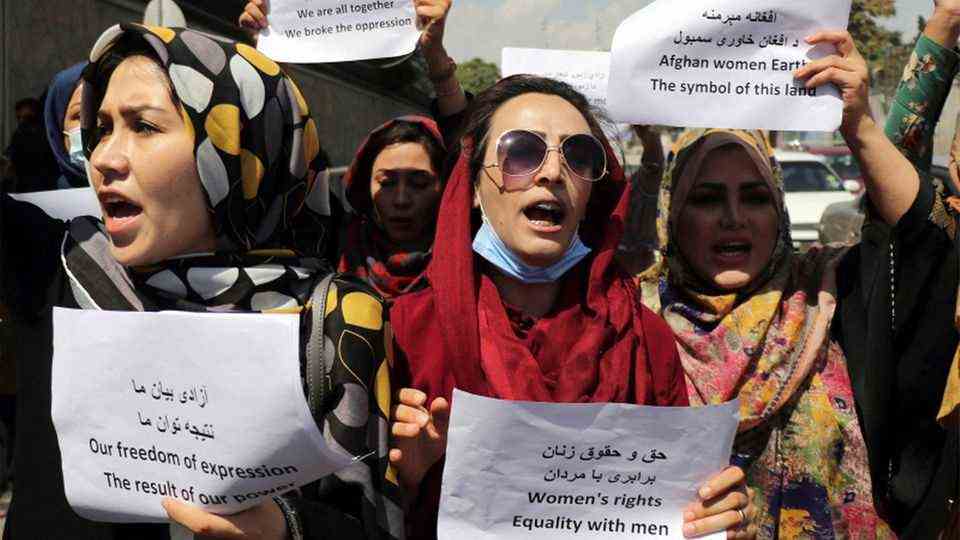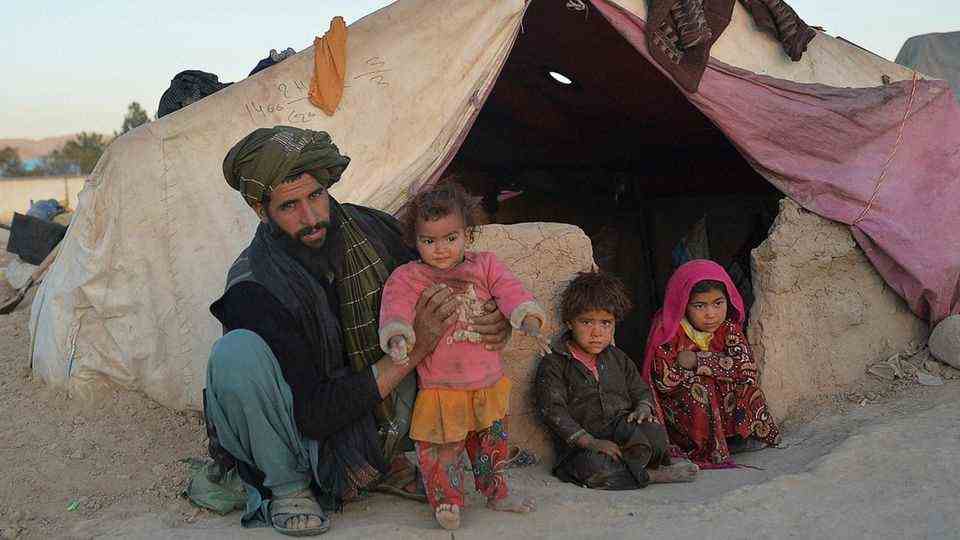The Taliban have been ruling Afghanistan since August – and the country is threatened with economic collapse. A spokesman for the Islamists has now told the US broadcaster NPR how the Taliban want to overcome the crisis and who they blame for it.
Four months ago, the Taliban usurped rule in Afghanistan. Since then, the militant Islamists have had their political opponents executed, drastically restrict women’s rights, censored television and banned music. At the same time, the government has been trying to gain international recognition since it came to power in mid-August, demanding economic support, the release of frozen cash reserves and asking for humanitarian aid.
Indeed, so far not a single country in the world has recognized the Taliban government. On the contrary: after the fall of the elected representatives in Kabul, a large part of the international aid to Afghanistan was discontinued – also out of concern that it would support the new regime. The Afghan central bank’s balances, which are mostly in the USA, in the billions, have been frozen. The previously ailing economy has since been in free fall, food prices have soared and millions of people are either threatened with or are already starving.
The Taliban’s political bureau spokesman, Mohammad Naeem Wardak, is now in Doha US broadcaster National Public Radio (NPR) described in a 40-minute interview how the Islamists want to lead Afghanistan out of the crisis and what demands they are making on the international community.
Afghanistan demands recognition and access to cash reserves
“We want to be positive with the whole world and all countries,” assured Naeem. “We don’t want any problems.” The government in Kabul is not on the side of one country against another, but strives for relationships with all. And their relationship with one country was not at the expense of another. That is Afghanistan’s position vis-à-vis its neighbors, vis-à-vis the countries of the region and vis-à-vis the countries of the world. “We don’t want to be victims of regional and international conflicts.”

When asked what the Taliban were doing to solve the many problems in Afghanistan, the spokesman denied any responsibility for the precarious situation: “In reality, we did not create these problems. These problems came from outside.” Naeem named the “economic siege”, the lack of access to the country’s cash reserves frozen by the US and “other problems with the banks” as the greatest challenges in this context.
The Taliban had done their job, stressed Naeem. “We try, as you know, to be in constant contact with various governments and international groups, the US, European countries and so on. We are trying to convince these groups to recognize the Afghan people and their rights, and this siege and this one End problems. “

The people in Afghanistan need support. We forward your donations to organizations that take care of refugees. You can donate here.
The spokesman made it clear that foreign countries would not achieve anything by putting pressure on the Afghan people, because the Afghan people have been under pressure for 40 years and will not give in. “That is why we say these efforts are pointless, and we tell the international community, especially the United States, that we believe that these problems will come to an end if they recognize these realities as well as the Afghan government.”
Taliban blame occupiers for “distorted image of the upbringing of girls”
Naeem also sees no reason for self-criticism when it comes to the lack of educational opportunities for girls, denounced by Western countries and human rights organizations. It is a “sensitive topic” with “some problems”, he admitted in the NPR interview, but also made it clear where he sees it and who he blames for it: “As [westliche Streitkräfte] When they came to Afghanistan, they carried out some actions that distorted the image of women’s education in the Afghan population – for example, girls dancing on television, for example for women and girls to give up some of the cultural norms of society. All of this has resulted in the majority of Afghan society having a distorted view of the upbringing of girls. “
Unfortunately, as in other societies, there are false traditions and customs in Afghanistan, Naeem noted. For example, in most regions of the country girls and women do not have the right to inherit, to choose a husband, or at least to consent to their father or others doing it for them. And if a woman’s husband dies, according to the traditions of some tribes, she passes into the possession of the patriarch of the house, her husband’s brother, or others. They would marry the woman as they saw fit and would not be allowed to choose.

According to the Taliban’s Hanafi law school, such things required the consent of the girl concerned, said Naeem. There are also several decrees from Taliban leader Haibatullah Akhundzada. One of the first is that a woman is a free human being and no one has the right to regard her as his slave or to believe that she has no choice of her own.
In fact, in large parts of the country, girls are reported to be banned from going to school after 6th grade and women are no longer allowed to study with men. “The co-education is contrary to the principles of Islam as well as to national values, customs and traditions,” the incumbent minister for higher education, Abdul Baghi Hakkani, announced in September.
The situation is “not quite as it is described by some international media, that girls in Afghanistan are not allowed to go to school,” claimed Naeem. The private universities are open to girls. There are also secondary schools run by governmental and non-governmental organizations that are open to girls. Private secondary schools are open across the country and public secondary schools are also very open in large parts of the country.
The Taliban are neither against the training nor against the work of women, assured Naeem. Their religion even commands them to give women the right to work, and under the Taliban women worked in ministries and other areas as well as in the media. “But the work and the training must be designed and organized in such a way that they are in accordance with the traditions of our people.”
The Taliban had presented the US with evidence that all minorities and tribes of Afghanistan and women are represented in the Kabul government, Naeem told the US broadcaster. “We see and have seen that women work and learn in different areas, but we are trying, God willing, to solve this problem in the future too.”
Taliban want to protect historical monuments
Naeem also spoke to NPR about the protection of the Afghan cultural heritage: he explained that this task had been entrusted to the Ministry of Information. Together with the Ministry of Education, research has started in various provinces in order to preserve the old monuments that can be found in museums and other places. “They are part of our history and part of the identity of the Afghan people, which goes back about 5,000 years,” the spokesman said. “So we will keep them and we have no problem with the heritage or the historical monuments.”
During the first Taliban rule in Afghanistan, the Islamists showed themselves to be less historically aware: in March 2001 they destroyed the one and a half millennia-old, tallest standing Buddha statues in the world in the Bamiyan Valley. Even after they came back to power in August, they are said to have blown up a statue of a Hazara leader, the Shiite minority in the region, and looted art treasures from a museum in Bamiyan.
Source: National Public Radio



